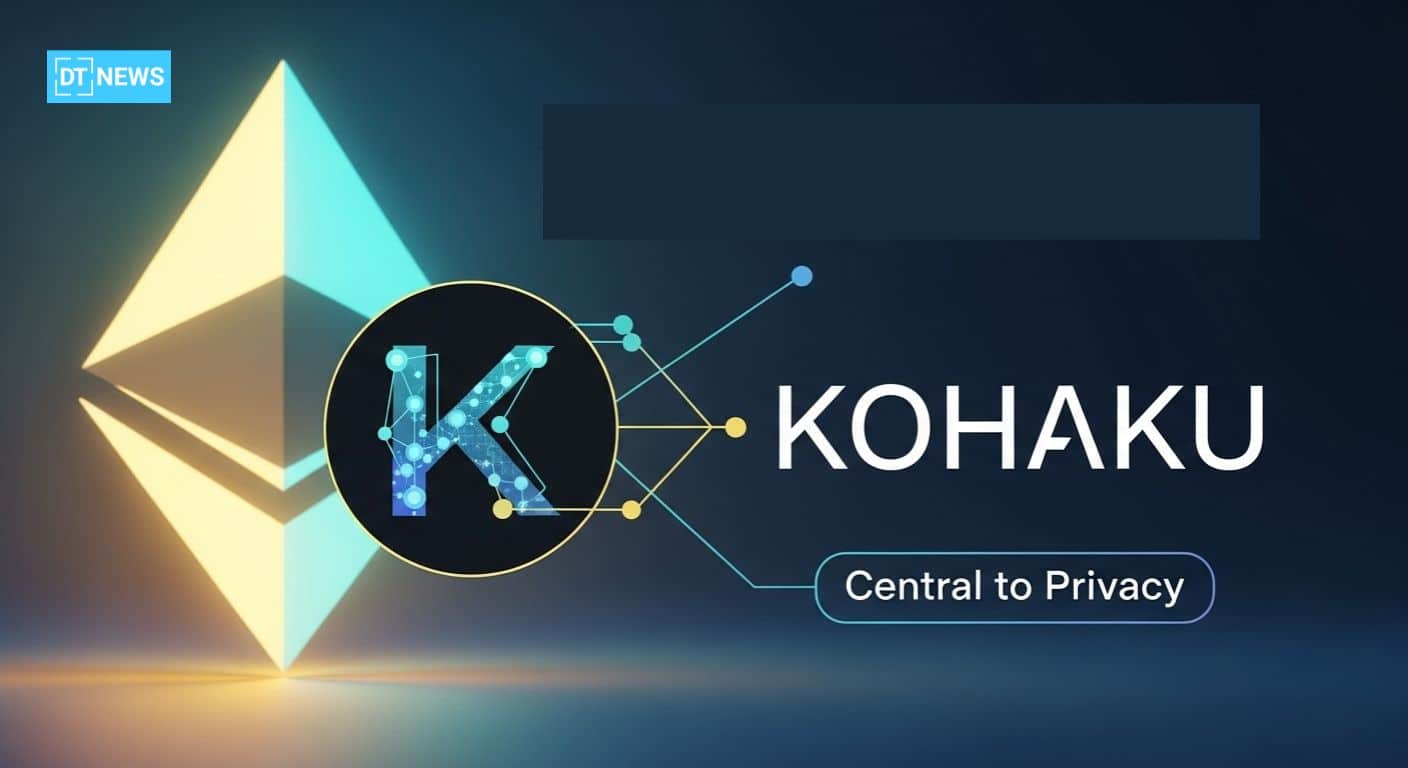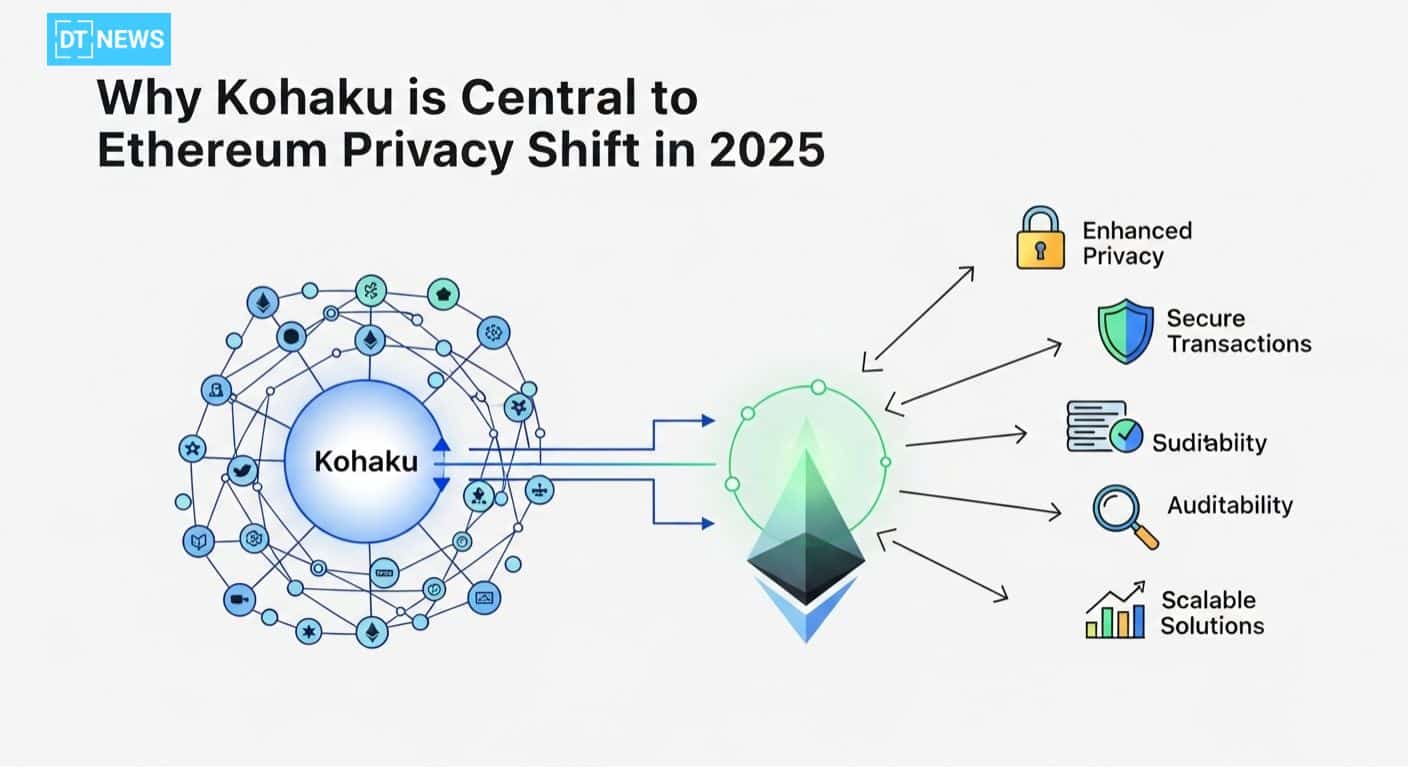This article was first published on Deythere.
- The 2025 Privacy Push in Ethereum
- What is Kohaku?
- Kohaku’s Cryptographic Mechanisms
- Privacy Features in Ethereum Wallets
- Who is Backing Kohaku?
- Adoption and Implications
- Expert Analysis: Breaking Down Kohaku
- Conclusion
- Glossary
- Frequently Asked Questions About Ethereum Privacy and Kohaku
- What is Kohaku?
- When was Kohaku introduced?
- How does Kohaku protect privacy?
- Who is behind Kohaku?
- Does Kohaku have a token?
- References
Ethereum is doubling down on privacy in 2025, and Kohaku is at the heart of this. Kohaku is an open-source Ethereum privacy framework that allows developers to create Ethereum privacy-focused wallets and services. It is presented by the Ethereum Foundation, headed by Vitalik Buterin and Devcon demos.
By enabling anonymization (via stealth addresses, zk-Snarks, and other privacy protocols), Kohaku makes Ethereum privacy a for-sure, in-built thing rather than some kind of optional add-on.
The 2025 Privacy Push in Ethereum
Ethereum’s 2025 road map, emphasizes privacy front and center for the first time. As Vitalik Buterin warned, “If there is no privacy transformation, Ethereum will fail,” because the truth is many users want privacy.
The Ethereum Foundation established a 47 member team in early 2025 called “Ethereum PSE” focusing on real-world privacy-enhancing solutions and formed a cluster divided into researchers and engineers.
Vitalik and the Foundation have shared privacy roadmaps and introduced special efforts (like institutional privacy task force to embed confidentiality “as a first-class property” in Ethereum.
The effort of these months resulted in Kohaku launch in November 2025 (Devcon, Argentina). This new suite of tools is expressly promoted as a complete privacy solution for Ethereum wallets and users. In other words, Ethereum’s strategy for the year 2025 is to standardize on-chain privacy, and Kohaku sits at its core.
What is Kohaku?
Kohaku (meaning Amber in Japanese and a type of koi fish) is not a crypto token or a wallet product. It’s a modular software framework (an SDK) and a reference wallet application for actually anonymous cryptocurrencies or privacy coins.
The aim is to provide plug-in privacy primitives for wallet developers so that they can more easily incorporate privacy features into their product offering than requiring users to limit themselves all to one app.
Kohaku offers a package of components (cryptographic modules, protocols and a plugin system) that can be incorporated into the code of developers. It includes an SDK and a reference browser-extension wallet (forked from the Ambire wallet).
Wallet teams can pick and choose features using a plugin system. For instance, they could be used to allow private transactions or enable stealth addresses or social recovery, depending on user needs.

The initial focus is Ethereum’s mainnet; support for Layer 2 networks will follow (with stage-1 L2s prioritized)
The reference wallet is not for average users, “power user” and developer are the targets. Kohaku’s design is for people who will need tight privacy controls and are comfortable with higher-level tooling.
Think of Kohaku as a privacy “operating system” for Ethereum wallets. It layers on top of existing privacy protocols (like Railgun and Tornado Cash) and adds new tricks, so every layer of the stack (user device, network and blockchain) leaks as little information as possible.
Kohaku’s Cryptographic Mechanisms
Kohaku uses a body of advanced cryptographic techniques to ensure privacy from start to finish. Its key mechanisms include:
Stealth Addresses (ERC-5564): The use of stealth addresses is the highlight of the system. A user (say Bob) creates a secret ad hoc key pair associated with his public wallet. When somebody (call her Alice) wishes to send some money to him, she constructs a one-time stealth address from Bob’s public key and sends the amount of funds to this address.
Only Bob, who knows that secret key, can look over the blockchain and go spend that deposit. Since every address Bob uses is not only random but also used once, on-chain observers cannot identify a transaction with an account held by Bob. It strengthens Ethereum privacy by hiding the transaction graph links.
Zero-Knowledge Proofs (ZK): Kohaku has privacy pools (similar to Railgun) that shield transactions with zk-proofs. For instance, users can shield funds into a pool; the wallet confirms transactions using ZK proofs in such a way that only encrypted “state updates” will ever become visible on-chain, not senders, receivers or amounts.
Such proofs guarantee soundness but do not disclose any information. The Kohaku roadmap focuses on ZK-SNARK and ZK-EVM investigation, to grow these capabilities further.
Private Information Retrieval (PIR) & ORAM: To read a data privately, Kohaku utilizes cryptography to obfuscate what the user is asking. It could possibly use Trusted Execution Environments with Oblivious RAM (TEE+ORAM) to load blockchain data without revealing what portion is being read.
It aims to leverage Private Information Retrieval (PIR), which will allow users to fetch contract data from servers without the servers knowing what addresses they access or where information is stored.
Local Light Client (Helios): In order to prevent local node metadata leakage, Kohaku operates a browser based Ethereum light client (Helios). This allows the wallet to validate blockchain state locally on-chain so it doesn’t have to trust or ask a centralized RPC node that might log the user’s IP and operations.
P2P Transaction Broadcasting: Users can choose to broadcast transactions directly to the Ethereum P2P network instead of through a public RPC relay. This also mists the network fingerprints.
1 Account 1 dApp: In order to prevent an on-chain observer from tracking users across sites, Kohaku defaults to generating a new address every time users connect to a dApp. This compartmentalizes activity.
Social Recovery via ZK: Kohaku aims for a standardized privacy-preserving social recovery (ZKEmail, ZKPassport protocols) so users can recover wallets without the need to disclose their identity.
Post-Quantum Security: Anticipating future attack methods, Kohaku offers optional post-quantum signature support, such as Falcon and Dilithium, to protect keys.
Hardware Wallet Integration: It even envisions open source hardware wallet apps that are universal and ZK compatible to sign transactions (with curves like Jubjub) to circumvent vendor lock in.
This functionality provide Kohaku’s “end-to-end” privacy. Kohaku, unlike single method solutions, fills the “gaps” from device Trust, Network metadata, and user interface. As one Ethereum dev summarized it, Kohaku is a way to ensure that party A and party B knows only what is directly necessary… minimizing exposure and risk”.
Privacy Features in Ethereum Wallets
| Feature | Standard Wallet | Tornado Cash | Kohaku (Ethereum) |
| Transaction Privacy | None (all TXs public) | On-chain mixing (anonymity set) | Stealth addresses + zk-proofs |
| Wallet Addresses Reuse | Yes (single account) | Pooled (many users) | New one-time address per recipient |
| Data Query Privacy | Via RPC (IP logged) | N/A | Local light client (Helios) & PIR |
| Metadata Exposure | High (RPC logs, reuse) | Reduced (pool only) | Low (P2P send, per-dApp accounts) |
| Regulatory Compliance | Fully transparent | Difficult (no audit) | Audit-friendly (selective disclosure |

Who is Backing Kohaku?
With Kohaku being published by the Ethereum Foundation, this suggests significant institutional support.
The design of Kohaku is being directed by Ethereum Foundation developers Nicolas Consigny and Vitalik Buterin. Nicolas wrote the technical roadmap for it, and Vitalik helped introduced the project at Devcon.
The now-named Privacy and Scaling Explorations (PSE) team is deeply involved The 47-member privacy cluster (Oct. 2025) incorporates Kohaku as part of a larger plan.
Kohaku is the product of several existing teams working together. The reference wallet is a fork of Ambire (hence the “amber/kohaku” name), and partners include Ambire Tech, Railgun, Wonderland, a16z’s Helios light client, Oblivious Labs, ZKnox and more. Railgun provides on-chain shield pooling, and Helios offers local chain verification.
Many Ethereum based researchers, auditors and developers (e.g Igor Barinov, Nicolas, cryptographers) jointly contributed to the development of Kohaku’s road map.
In summary, Kohaku is supported by the Ethereum ecosystem. The joint announcement, Devcon demos, the mix of Foundation teams and non-Foundation projects is evidence of broad coalition building.
Combined with so much support from the community, this means that one can expect Kohaku to be supported in many wallets and tools, popularizing privacy on Ethereum.
Tthe name “Kohaku” stands for amber, represented by a red and white colored koi fish. The Koi motif is inspired by the Ambire Wallet’s amber branding and holds Kohaku’s root origin is as a privacy tool (Ambire being basecode after all)
Adoption and Implications
The focus on privacy has captured investors’ attention. For instance, privacy-focused tokens such as Railgun (which Kohaku uses) skyrocketed in price after the Kohaku announcement. According to some other analysts, privacy coins were up more than 65% over the past month. This indicates that traders see Ethereum privacy products as the next bank of value.
Kohaku speaks to regulators’ concerns with compliance-friendly privacy. It makes privacy features more digestible for businesses by allowing selective disclosure of transaction details for audits.
A number of the leading crypto wallet developers are looking into Kohaku’s SDK. And because it’s modular, existing wallets like MetaMask, Coinbase Wallet and the like can slowly incorporate these privacy plugs without needing a hard fork.
This could create “private by default” transactions throughout dApps. And the usability plus performance improvements may also attract regular users who didn’t want to go near anonymizing mixers.
Kohaku is expected to drive layer-2 and DeFi adoption through improved privacy.
Expert Analysis: Breaking Down Kohaku
Experts emphasize that Kohaku is something new. In the place of treating privacy as an elective add on, Kohaku weaves it into wallets and the protocol stack. Vitalik has promoted this direction himself.
In a blog post in 2023, he claimed that by making all transactions public, it leads people to centralized systems; a privacy cost Ethereum cannot afford. And by normalizing strong privacy, Kohaku goes straight into addressing that.
Cryptographers and Ethereum developers talk a lot about Kohaku’s composability. They note that Kohaku doesn’t design a new magic cipher, but rather mixes known building blocks (zk-proofs, stealth, MPC etc.) together.
The modular structure also allows new privacy schemes (e.g.upcoming ZK-EVMs) to plug in. This future-proofs Ethereum’s privacy roadmap.
As an EF developer said, Kohaku allows transactions to disclose only the absolute required minimum, as opposed to a wholesale disclosure of modern-day accounts’ affairs.
Another quick clarification: Kohaku’s compliance focus. Privacy expert quotes that Kohaku wants to offer privacy and auditability at once.
Railgun’s Private Proofs of Innocence illustrates how someone can prove that their funds are innocent (ie not illicit) using on‐chain datasets without revealing anything beyond what the prover wants to reveal.
This method could make it possible for regulated institutions to be able to work with crypto in a private way.
On the whole, analysts believe that Kohaku integration could make Ethereum’s base layer natively privacy friendly. Instead of DApps tapping on mixers or zero-knowledge layers, privacy becomes an integral component of the protocol logic.
If successful, this lowers the friction to users and raises Ethereum’s competitive edge. As experts put it, Ethereum’s renewed privacy push transforms privacy from an “optional feature” into a core infrastructure component
Conclusion
Ethereum privacy upgrades like Kohaku are said to be at the heart of of the Ethereum’s 2025 vision. Kohaku’s privacy toolkit with stealth addresses, ZK proofs, local light clients, and more, makes privacy a built-in capability for users and developers.
Backed by the Ethereum Foundation and an extensive community of partners, Kohaku is preparing to revolutionize adoption through compliant end-to-end privacy.
All-in-all, it can be said that Kohaku is a catalyst that ensures privacy becomes commonplace as Ethereum matures, and also an integral part of the network design.
Glossary
Stealth Address: an address generated one time using the user’s public key. It’s used by senders to shield recipient of a transaction, on-chain. Part of ERC-5564.
Zero-Knowledge Proof (ZKP): A type of cryptographic proof that enables one party to prove to another party the truth of a statement, without revealing any information beyond the fact that this specific statement is true. Used in private payments.
Privacy Pool: A smart contract mix or pool (like Tornado Cash, Railgun) with which one can submit funds in conjunction with additional users. It is about breaking the links between senders and receivers.
Helios Light Client: An Ethereum light client made by a16z that can run in the browser. Enables to check transactions in a local manner without trusting other nodes.
Privacy Cluster: A research and development team of 47 researchers/developers launched in 2025 by Ethereum Foundation to bring privacy onto the entire stack.
Frequently Asked Questions About Ethereum Privacy and Kohaku
What is Kohaku?
Kohaku is an open-source Ethereum Privacy toolkit. It is an SDK and a sample wallet for developers who want to include advanced privacy features in their Ethereum wallets.
When was Kohaku introduced?
Kohaku was formally announced in October 2025, and showcased at the Ethereum Devcon show in November 2025.
How does Kohaku protect privacy?
It utilizes one-time stealth addresses (from ERC-5564 standard) so that funds are hidden when they’re sent; and zk-proofs, privacy pools to shield transactions. It further mitigates metadata leak through a local Ethereum client and per-dApp addresses.
Who is behind Kohaku?
Leading Kohaku is the Ethereum Foundation, represented by developer Nicolas Consigny. Collaborators to date include Ambire, Railgun, and a16z’s Helios light client among others.
Does Kohaku have a token?
No, Kohaku is not a token or coin? It is a privacy protocol and software framework funded by the Ethereum Foundation and other ecosystem participants.






































